Sense of Place: Two books by U-M professors explore Jewish culture, arts, and community
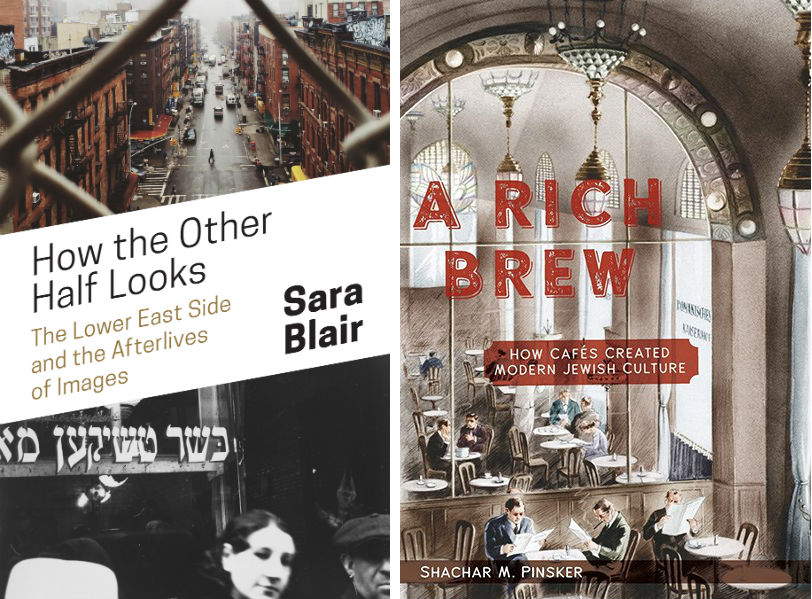
People need a place beyond home and workspace. Community, this sense of “third place” and placemaking, is featured prominently in How the Other Half Looks: The Lower East Side and the Afterlives of Images by Sara Blair and A Rich Brew: How Cafes Created Modern Jewish Culture by Shachar M. Pinsker.
The authors, both professors at the University of Michigan, say that their books began at the Frankel Institute for Judaic Studies. Both were part of a fellowship named Jews in the City, which brought together scholars from a variety of disciplines and led to publications about topics such as Tel Aviv’s Old Cemetery, the Jewish Ghetto of Turin, and the Soviet Shtetl.
Her Story Is History: Brenda Travis, "Mississippi’s Exiled Daughter"

Brenda Travis surprised me.
When she came to AADL on September 27 to discuss her book Mississippi’s Exiled Daughter with her co-author, John Obee, I hadn’t expected her to burst into song. But that’s exactly what she did, singing parts of "Ella’s Song," a tune written in honor of civil and human rights leader Ella Baker. The audience joined in, singing with her. Her talk was not to be a passive listening experience.
“Until the killing of black men, black mothers’ sons,
is as important as the killing of white men, white mothers’ sons ...
We who believe in freedom cannot rest until it comes”
--lyrics from "Ella’s Song"
Travis then explained that one of the reasons that she’s still on the civil rights journey is that she still believes in freedom. “There is still a place called hope," she said, "and we have to make hope our homes. We have to continue this struggle and fight until we can get it right. ... To the young people, I’m hoping tonight that I can instill or wake up something within you to want to carry on this battle, to carry on this fight, because if you don’t we’re going to be lost -- not just a nation but a lost world.”
Patrick Flores-Scott's "American Road Trip" traces how PTSD affects the lives of three siblings
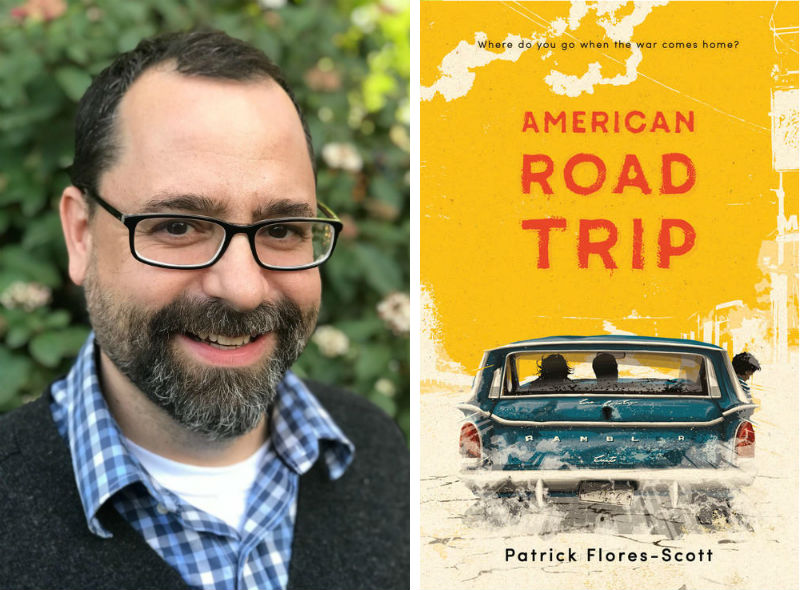
Ever wanted to get in your car and take off across the country? Who among us has not sat behind the wheel of the car and contemplated going instead of east into the sunrise instead of west into the office, going on a grand adventure? But what if you had to go on a road trip -- to save your brothers, save your family?
That’s the dilemma facing the Avila family in Patrick Flores-Scott’s latest book, American Road Trip. While life looks good for Teodoro “T," things aren’t so promising for older brother Manny, a soldier just home from Iraq with overwhelming PTSD. To save them all, their sister Xochitl takes the brothers on an epic road trip where the siblings deal with everything from socioeconomic pressures to first love to mental health issues plaguing our veterans.
Flores-Scott, an Ann Arbor native, was inspired to create a character who was a veteran with PTSD after hearing a story on National Public Radio.
The Art of Eating (& Living) Well: Cookbook author Julia Turshen & Chef Kate Williams at Literati

“For Grace, whom I fell in love with then and do again and again …” --Julia Turshen’s dedication in her newest cookbook, "Now & Again"
Had food writer/home chef Julia Turshen and creative-community blogger Grace Bonney never fallen in love, I may not have been introduced to the cookbook author’s work. I had loosely followed Bonney’s work at Design*Sponge for years. While I’m not in the habit of following the personal milestones of strangers, the moment I found out Bonney was married to Turshen, I thought, “Well, she’s gotta be cool,” and promptly followed her on Instagram. I’ve been intrigued ever since.
On Monday, September 24, Turshen visited Literati to talk about her latest cookbook, Now & Again: Go-To Recipes Inspired Menus + Endless Ideas for Reinventing Leftovers. She was in conversation with chef Kate Williams from Lady of the House restaurant in Detroit and journalist Ashley Woods.
After the audience settled in the space, reinitiating us to fall time in Michigan as we figured out where best to lay our umbrellas, Woods began the talk by asking Turshen and Williams how food and community became entwined for each them.
ESPN's Tom VanHaaren tells untold tales about football recruiting in "The Road to Ann Arbor"
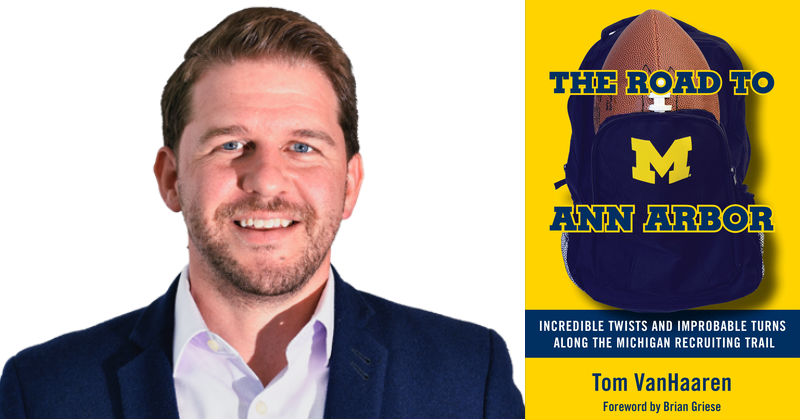
There are as many stories of how to make it to the Big House as there are players: a 1968 recruitment by a memorable assistant coach, the near misses of some of the biggest names, and all those stories about Bo.
ESPN journalist and Michigan native Tom VanHaaren tells all these tales and more in his new book, The Road to Ann Arbor. VanHaaren has reported on college football and recruitment since 2011, starting his career covering Michigan football.
The catalyst for this book came from an interview with Bobby Morrison, a former recruiting coordinator. VanHaaren says, “[Morrison] still follows recruiting pretty closely and after we finished talking about the story I was working on, he told me that he had some great recruiting stories from his time at Michigan.”
The first story Morrison told VanHaaren was how Tom Brady came very close to ending up in another program.
A Constellation of References: A2 poet Hannah Ensor's book looks at sports, pop culture & love

Jurassic Park. The Super Bowl. The Grand Canyon. The sitcom Friends. All seemingly unrelated, but they coexist in Love Dream With Television (Noemi Press), a new book by Hannah Ensor. Poems in this collection are breathy and fast, while grounded in art and pop culture.
Ensor is the Hopwood program manager at the University of Michigan, where she completed her Bachelor’s degree. She then earned her MFA at the University of Arizona. Having returned to Ann Arbor and published her new book this month, Ensor will read at Literati Bookstore on Wednesday, October 3, at 7 pm and speaks with Pulp here.
Poet Elizabeth Schmuhl’s "Premonitions" makes connections to the natural world

While I get déjà vu from my dreams, I do not usually experience premonitions. Sometimes I might have them about people I meet, but the premonitions are usually wrong and maybe excess cautiousness instead. So when I started reading Elizabeth Schmuhl’s new collection of poetry called Premonitions (Wayne State University Press), I was intrigued by what they might be.
Schmuhl, who describes herself as having lived all over the place (Chicago, New York City, Washington D.C., Atlanta, and Michigan), covers a range of topics beyond premonitions in her new book. Elements of the natural world, seasons, and change also figure strongly in the poems. As an artist with many talents, including dance, Schmuhl also includes bodies and movement in the collection.
Poems in Premonitions are not titled but rather numbered, and the number is encircled by a colored dot. Dark topics, from death to loneliness, contrast bright colors and hopeful moments.
The first poem drops us into a world without internet, which perhaps makes premonitions more possible in the absence of the constant fact-checking and forecasting that are rampant online. Reading Premonitions can feel like a fascinating flux of trying to get one’s bearings, finding a line that centers oneself, and then finding that the next line changes it all.
Schmuhl will read at Literati Bookstore on Tuesday, October 2, at 7 pm. Ann Arbor poet Keith Taylor will introduce her and conduct a discussion with her. She shares about premonitions, her collection, and more about her life in the following interview.
Building a Steampunk: An Ann Arbor writer-editor navigates the self-publishing world

Artists, whether of visual, performance, musical, or writing persuasions, are highly imaginative and generally motivated individuals. The trouble with surrounding yourself with creative people is that you want to create. You throw ideas out there, bounce them around; sometimes they land, sometimes they float away into the ether. It’s most fun when they land, but that can also mean a lot of hard work for these ideas to claw their way to fruition.
For example, a year of pummeling away at stubborn obstacles, wrangling six other people, recruiting still more people to help in the fight, battling back and forth with a totally uncooperative corporate entity whose official help policy is “we don’t help.” It’s frustrating, it’s time-consuming, and it’s so worth it. Seeing your name on the printed page provokes a singular, feeling of satisfaction and accomplishment. Before long, you’ve forgotten all the pain and miserable moments, and you can only think about doing it again.
Past, Tense: U-M grad Akil Kumarasamy's "Half Gods" is a masterful debut
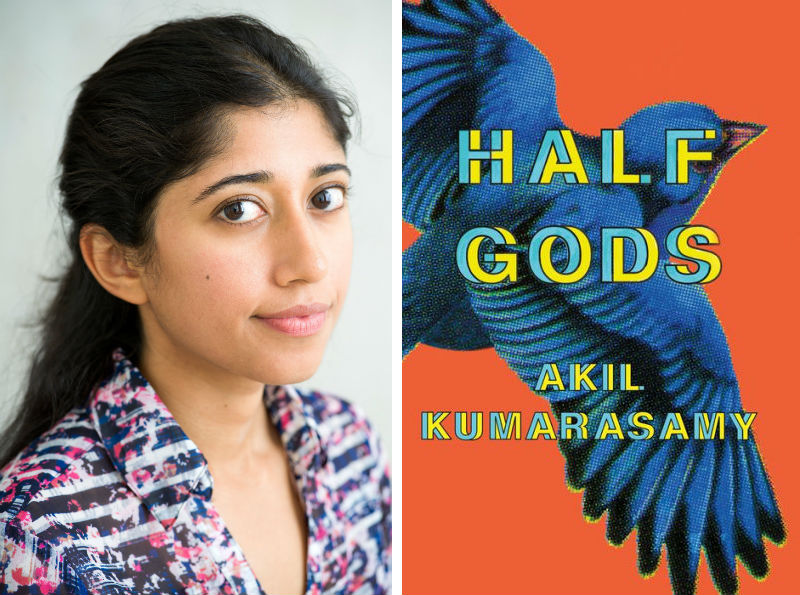
“The past is never dead," wrote William Faulkner. "It's not even past.”
The past is always present and rarely quiet in Akil Kumarasamy’s masterful debut novel, Half Gods.
The Sri Lankan civil war lasted more than 25 years, officially ending in 2009. The 10 interlinked stories in Half Gods tell the story of Nalini and her family, for whom the war is neither dead nor past. After the slaughter of her mother and brothers, Nalini and her father escape to New Jersey with their grief following right along with them. The stories travel through narrators with some of the focus on Nalini as a child and then as a grown woman with children of her own. Other stories include a man in Sri Lanka looking for a missing child, a butcher from Botswana transplanted to New Jersey who falls in love with Nalini all told through short stories.
Vision for Flint: Dr. Mona Hanna-Attisha's “What the Eyes Don’t See” tracks the city's public health crisis
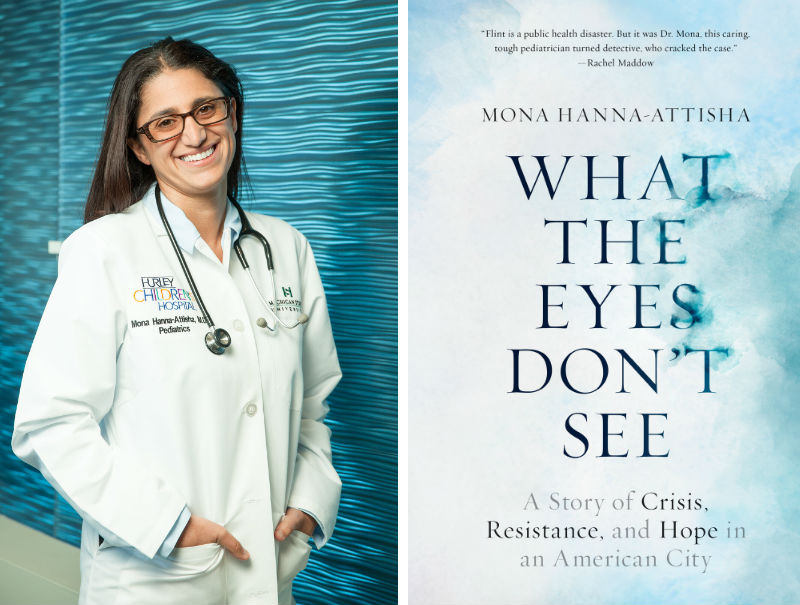
While it’s easy to see the Flint water crisis as a story of government failing the people it’s supposed to serve, it’s a lot more than that. It’s also the story of a resilient community, the determined people who live there, and the activists who helped bring the situation to light.
Those stories meet in the work of Dr. Mona Hanna-Attisha, director of the pediatric residency program at Hurley Medical Center. She played a pivotal role in the crisis, conducting research and publicizing results that showed how lead levels rose alarmingly in Flint children after the city switched its water source.
Now “Dr. Mona” has published a book about her experience, What the Eyes Don’t See. She will discuss the book at Rackham Auditorium with Chris Kolb of the Michigan Environmental Council, an event sponsored by Literati Bookstore and the U-M School for Environment and Sustainability, where Hanna-Attisha earned her bachelor’s degree (under its earlier name, the School for Natural Resources and the Environment).
“I never set out to write a book in my career,” Hanna-Attisha said in a recent phone interview. “It’s not about Flint, it’s about who we are and who we want to be.”


































